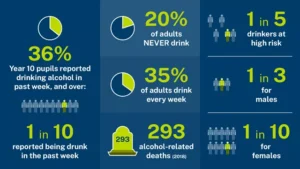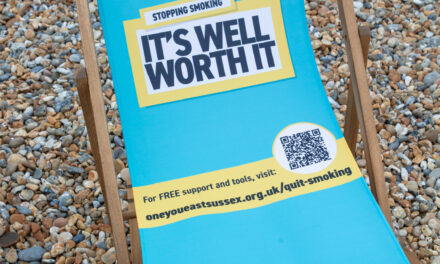Have you ever thought about the role alcohol plays in our society? Chances are you have celebrated a successful or joyful time with a beer or a glass of wine. For example, we raise a toast at weddings and ‘wet the baby’s head’ when we have a child.
We might also look to a glass of something alcoholic to relax after a stressful day at work or to console ourselves if something unwanted happens in our lives.
Each day we’re bombarded with adverts for alcoholic products. They pop up during breaks in programmes, at sporting events or on billboards as we travel. Even our favourite television characters can, at times, appear to glorify drinking.
It’s fair to say there is a drinking ‘culture’ in the UK. For most of us, our relationship with drinking alcohol is kept to the occasions mentioned above. But for some, a fun drink on a Friday night can soon turn to alcohol playing a leading role in their lives.
When drinking alcohol begins to play a central role it can become harmful. This Alcohol Awareness Week we’re raising awareness about the harm alcohol can cause. Highlighting how it affects us, and how we can improve our health and wellbeing by taking better control of our drinking.
Are you a ‘risky drinker’?
Many people consider themselves to be moderate drinkers. In reality, they could be drinking more than the guidelines suggest. The Chief Medical Officers’ recommendation for both men and women is no more than 14 units per week spread across three days or more. Fourteen units are around six medium (175ml) glasses of wine, or six pints of 4% beer.
As a teenager, my friends would share a bottle of something sugary and vaguely fruit-flavoured at a park. It felt like we were finally the adults we longed to become. As we got older it would be a few pints in the pub, playing pool and chatting.
We would have been classed as ‘risky drinkers’ because we drank more than the weekly recommended number of units of alcohol. We never realised we were doing this because it was spread over a few days. Looking back, it was very easy to fall into that ‘risky drinker’ category without knowing or understanding the risks.
Alcohol’s affect on health and wellbeing
While drinking alcohol can help us socialise or cope with a life event, alcohol can have a harmful effect on our health and wellbeing, especially if we drink too much.

In East Sussex, more than a quarter of people drinking alcohol (aged 16+) are thought to be risky drinkers. There are 5,224 adults living in East Sussex who are dependent on alcohol. Alcohol dependence operates on a spectrum – from mild, to moderate or severe. If you’re concerned about yourself or someone you know being alcohol dependent you can find out more on the Drink Aware website.
While several factors cause people to drink, it’s understood that people on lower incomes drink less than those on higher incomes; the latter is more likely to exceed the recommended number of units each week.
However, alcohol harm – where people are hospitalised for alcohol-related reasons –is highest in the most deprived areas of the country. That is true for our county, where there are levels of deprivation within our five districts and boroughs.
People in those areas are many times more likely to experience health concerns related to drinking alcohol. Each year, thousands of people experience long-term health issues from the alcohol they drink or die from alcohol-related causes. Drinking too much can raise the risk of developing a range of health problems. These include cancers of the mouth, throat and breast.
Alcohol harm can also include families, friends, communities, and broader society. Its impact can touch all parts of our society from hospital admissions, to neglect, violence, and sexually transmitted diseases.
Take back control
 If you’d like to cut down the amount you drink, a good way is to have several days each week when you don’t drink at all. Here are some other tips to help you if you’re drinking more than you’d like.
If you’d like to cut down the amount you drink, a good way is to have several days each week when you don’t drink at all. Here are some other tips to help you if you’re drinking more than you’d like.
- Pay attention. Recognise when you drink more than you’d like and plan how you’ll deal with it differently next time
- Keep track. Record what you drink for a couple of weeks
- Find ways to have fun that don’t include drinking
- Ask for help. If you’re struggling with alcohol try talking to your GP, local alcohol service.
Resources to help to you
If you’d like to cut down or quit drinking alcohol to improve your health, our One You East Sussex website has information on how to boost your health and wellbeing by changing your drinking habits.
If you’d like to understand more about your drinking, take the Drinking Check on the Drink Aware website. The website also has tips and advice to help you change your drinking habits.
If you, or someone you know, has a more serious issue with alcohol harm the substance misuse specialist service Change Grow Live can help.
Changing your alcohol habits
Alcohol never impacts people in isolation. Alcohol Awareness Week is challenging the stereotype of alcohol as an ‘individual’s problem’. It aims to raise awareness of the role alcohol plays in our society, and what it means to families, communities, health workers and those in our emergency services.
Alcohol Change UK, which organises the event, believes a change to our culture could help prevent alcohol misuse. It’s calling for improved regulation of alcohol marketing, clearer alcohol labelling, and better support and treatment. It also wants to create a culture that places people, not alcohol, at the centre of things.




